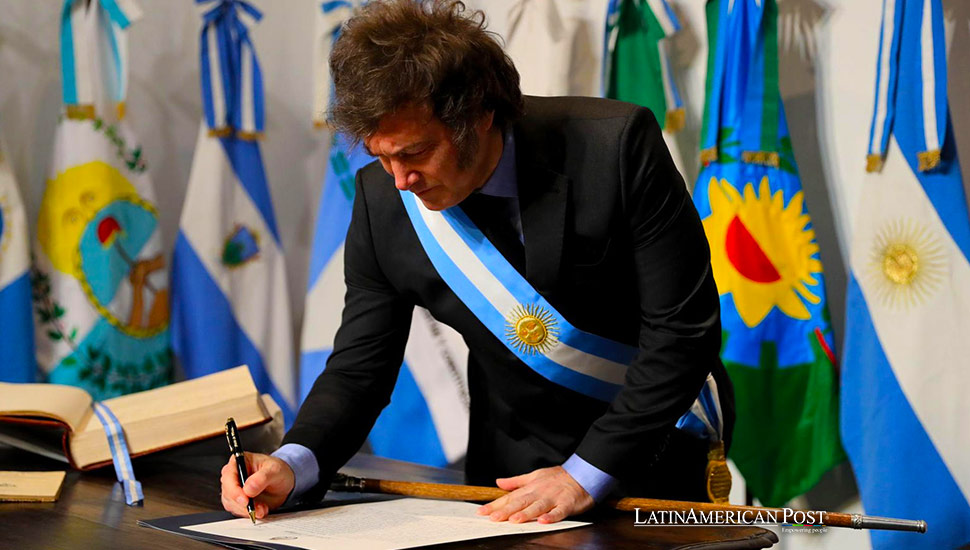Argentine President Javier Milei Seals Crucial Economic Pact with Governors

To stabilize Argentina’s faltering economy, President Javier Milei has secured a significant agreement with 18 provincial governors, aiming to garner more comprehensive support for his ambitious economic reforms.
Article: In the early hours of Tuesday, under the shroud of night and with a palpable sense of urgency, Argentine President Javier Milei signed a pivotal pact with 18 of the nation’s provincial governors. This long-awaited agreement, reached nearly seven months into Milei’s tenure, is a strategic maneuver to bolster his minority government and inject some much-needed stability into Argentina’s tumultuous economic landscape.
The agreement, christened the ‘May Pact,’ carries a weight of historical significance, harking back to Argentina’s May Revolution against Spain. However, its contemporary relevance is equally profound. Under Milei’s stewardship, Argentina grapples with severe economic challenges, including an inflation rate nearing 300% and a poverty rate that engulfs half of its populace. The pact aims to cement support across political lines, in the hope that Milei’s administration can steer the country through these tumultuous times.
Milei, a radical libertarian economist, emphasized the gravity of the moment in a speech delivered in Tucuman, the symbolic site of Argentina’s declaration of independence over two centuries ago. “Argentina finds itself at an inflection point,” Milei declared, calling for a decisive change in the nation’s economic direction. This rhetoric underscores his administration’s commitment to implementing sweeping economic reforms to stabilize the national economy.
Striving for Stability Amidst Economic TurmoilDespite the initial optimism that accompanied Milei’s ascent to power in December, the Argentine economy has struggled. The peso has weakened significantly, and political tensions have escalated as the economy slipped into recession. This backdrop makes the new pact with provincial governors all the more critical. The agreement covers ten key areas, including a commitment to a balanced budget, substantial cuts in public spending, and overhauls in tax and labor laws.
These measures are vital to achieving economic stability and attracting private investment. Martin Llaryora, governor of Cordoba, highlighted the cooperative nature of the pact, noting, “This pact shows that governors from different political parties can join forces so that the national government can manage this commitment.” Such collaboration is essential, as Milei’s La Libertad Avanza party does not hold a parliamentary majority and lacks any provincial governors, compelling it to negotiate continuously with other political factions to push through its economic agenda.
Legislative Challenges and Market Reactions
Milei’s challenges extend beyond gaining political support; the market’s response is equally crucial. Following the passage of two major legislative reforms in late June aimed at reducing public spending and stimulating the economy, the markets initially showed signs of recovery. However, this rebound was short-lived, as demonstrated by the peso’s 2% decline against the dollar in the informal market just this Monday, hitting a record low of 1,450 to the dollar.
The fragility of Argentina’s economy is mirrored in its currency’s volatility and the persistent investor doubts about the government’s ability to implement and maintain its reform agenda. The ‘May Pact,’ therefore, is not just a political maneuver but a critical part of Milei’s strategy to instill confidence among investors and the public alike.
Also read: Argentina Faces Recession and Job Losses Amid Austerity Measures
The agreement signed in the historic building where Argentina’s independence was declared is a poignant reminder of the nation’s resilience and enduring struggle for stability and prosperity. As President Milei looks to steer the country away from economic despair, the support from provincial governors across political divides offers a glimmer of hope. However, the actual test will be in implementing these reforms and their domestic and international acceptance. For now, Argentina watches and waits, hoping this pact will begin a much-needed economic revival.P





